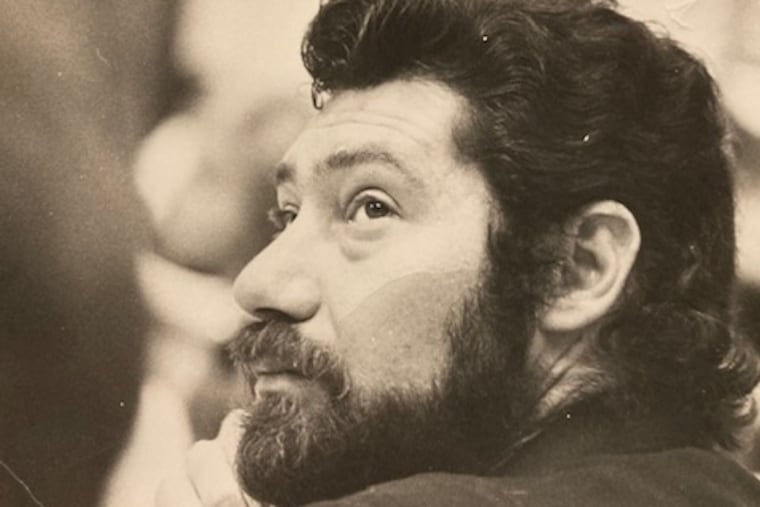Harold L. Rutenberg, former chief of cardiology at Pennsylvania Hospital and soulful sax player, has died at 89
He practiced medicine for six decades, taught at Penn and Temple medical schools, and played the saxophone at night and on weekends. “He was exceptional, humble, and dynamic,” his wife said.

Harold L. Rutenberg, 89, of Wynnewood, retired longtime doctor and associate clinical professor of medicine, former chief of the cardiology division at Pennsylvania Hospital, soulful saxophone player, veteran, and lifelong social activist, died Tuesday, May 14, of age-associated decline at his home.
For 61 years, from 1960 to 2021, Dr. Rutenberg ministered to thousands of patients and their families as a cardiologist and adviser, and to colleagues, family, and friends as a mentor and role model. He was a popular and innovative clinical associate professor in medical schools at the University of Pennsylvania and Temple and Thomas Jefferson Universities, and was affiliated for decades with Pennsylvania, Temple, Jefferson, and Wills Eye Hospitals.
He was director of the cardiac clinic and other cardiology programs at Temple Hospital from 1971 to 1975, and chief of cardiology at Pennsylvania Hospital from 1975 to 1981. He was a diagnostic expert in coronary artery disease, chronic high blood pressure, and cardiomyopathy, and everyone said he was just as adept at healing aches of the spirit.
“He listened to hearts his entire life,” said his daughter Emma. “But he didn’t just listen. He witnessed and responded.”
Dr. Rutenberg joined Temple’s school of medicine in 1967, rose to associate professor in 1973, and was recruited to lead the cardiology division at Pennsylvania Hospital in 1975. He “helped usher our cardiology division into the modern era,” Howard Haber, director of the hospital’s cardiac catheterization laboratory, said in a tribute. “He was the consummate physician.”
He earned academic awards for his mentorship and wrote papers and reports about unstable angina, myocardial infarction, and other cardiac issues for the New England Journal of Medicine, Lancet, and other publications. He operated his own practice near Pennsylvania Hospital from 1981 until his retirement in 2021 and, his family said, was as interested in his patients’ lives as he was in their illness.
“He was part investigator and part historian,” said his daughter Georgia Getz. “He was a patient advocate and a human advocate.”
Before all that, in 1951 and ‘52, Dr. Rutenberg was a featured sax soloist and drum major for the Camden High School band and orchestra. He went on to play mostly jazz and big band music at gigs and clubs all over town, including every Tuesday night for 30 years at the 23rd Street Cafe and other nights at the Hot Club and Manayunk Brewery.
He obsessed over John Coltrane, Miles Davis, and other jazz greats. But he also danced to disco and rock and roll. Nels Nelson, former jazz writer for the Daily News, said in 1977 that Dr. Rutenberg “is just a very talented man.” He was featured in a 1998 Inquirer story about professionals who play music on the side and said: “It’s hard for me to sit down at a table without humming or hearing music.”
He championed patriotism and social justice, served as an Army doctor in Korea in the 1960s, and later protested against the Vietnam War and other violence. He embraced liberal politics and his Jewish faith, and valued life over law, his family said.
“He was just so sweet and gentle,” said his wife, Patrice.
Born Sept. 29, 1934, in Philadelphia, Harold Louis Rutenberg grew up in Camden and earned a bachelor’s degree at Penn in 1956. He played the sax at gigs, weddings, and parties during medical school at Temple and graduated first in his class in 1960. He enlisted in the Army after medical school, didn’t like it much, but told his family “the TV show MASH got the martini-drinking part right.”
He married Jan Bateman, a drummer’s daughter, in 1964, loved her son, Greg Davis, and they had daughter Georgia. After a divorce, he met Patrice Raef at the 23rd Street Cafe, and they married in 1995. They had daughter Emma and lived in Society Hill and later Wynnewood, Narberth and elsewhere on the Main Line.
Dr. Rutenberg was an avid gardener and sometimes tossed sunflower seeds into vacant lots just to see what might happen. He read a lot, cooked delicious steaks, and served as the family historian. He was known for his long strides, funny giggles, and practical advice.
He liked to play ball, followed the Eagles and 76ers, and was at Veterans Stadium in 1980 when the Phillies won Game 6 to win the World Series. He lived with diabetes and overcame pancreatic cancer.
His former wife praised “his warmth and wisdom, his humor and his groove.” Her son Greg said: “His calm confidence just made you feel good. He was just such a beautiful cat.”
Getz said: “He was larger than life.” His wife said: “He was a sunflower.”
In addition to his wife, children, and former wife, Dr. Rutenberg is survived by four grandchildren, a sister, and other relatives.
A celebration of his life is to be held on Sept. 29.
Donations in his name may be made to Jazz Bridge Project Inc., 6703 Germantown Ave., Suite 200, Philadelphia, Pa. 19119.